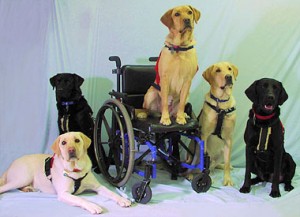 Service dogs for individuals with a disability and guide dogs for individuals with visual impairment are specially trained dogs that provide assistance with tasks the individual cannot perform and usually cannot be performed with less expensive assistive technology.
Service dogs for individuals with a disability and guide dogs for individuals with visual impairment are specially trained dogs that provide assistance with tasks the individual cannot perform and usually cannot be performed with less expensive assistive technology.
The costs of raising and training a service dog range between $20,000 and $50,000. Once the service dog is placed with a handler/owner, he or she is responsible for the dog’s food, shelter, supplies, grooming, and veterinary care. One of the factors considered in whether an individual will receive a service dog is the handler/owner’s ability to support the animal after placement.
In some instances, service dogs can be purchased by individuals from service animal trainers. However, the dogs are usually bred and trained by non-profit organizations with a mission to provide service animals to individuals in need. Because of the significant cost of raising and training a service dog, during the training process, private donors through the non-profit organization support the animal and costs of training. These donations often allow the donor the naming rights of the animal. Some organizations charge a fee for a service dog to offset some of the costs of training. Specific payment arrangements and fee structures depend on the training/placement organization.

Puppies Behind Bars is one organization that trains service dogs for veterans.
There is no federal or state funding specifically available to pay the costs of purchasing a service dog for a person with a disability. However, veterans who need a service dog, can contact the Veterans Administration for information about VA assistance in finding a service dog through a non-profit organization as well as subsidies for veterinarian care for a veteran’s service dog. For more information about applying for a service dog, contact Assistance Dogs International or the International Guide Dog Federation.

